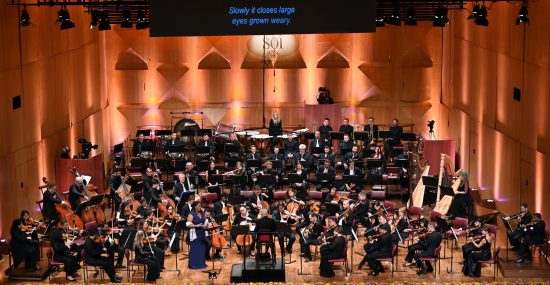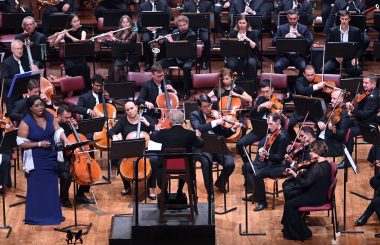 India R. Strauss: Angel Blue (soprano), Symphony Orchestra of India / Zubin Mehta (conductor). Jamshed Bhabha Theatre, National Centre for the Performing Arts, Mumbai, 25.8.2024. (JSM)
India R. Strauss: Angel Blue (soprano), Symphony Orchestra of India / Zubin Mehta (conductor). Jamshed Bhabha Theatre, National Centre for the Performing Arts, Mumbai, 25.8.2024. (JSM)

R. Strauss – Don Juan, Op.20; Vier letzte Lieder (Four Last Songs); Ein Heldenleben (A Hero’s Life), Op.40
Zubin Mehta headed four concerts in his native city of Bombay (now called Mumbai) conducting the Symphony Orchestra of India (SOI) in its homebase, the National Centre for the Performing Arts (NCPA).
It was a homecoming for Maestro Mehta in more ways than one. First of all, he was returning to the city where he was born; second, the programming represented his musical roots – the works of Johann Strauss II from Vienna, where he was educated; and the late-Romantic scores of Richard Strauss, which were very much a part of that education. This concert was his last performance and devoted entirely to the latter.
Anyone who thought of the SOI as a run-of-the-mill, second-tier orchestra, would not have recognised it in these performances. Mehta brought forth virtuosic playing and a full-bodied sonority, never heard before from this band. If anything, it was perhaps TOO loud, rarely dipping below mezzo forte and making one wish for more subtle shading and dynamics. So much so that one began to wonder if any electronic amplification was being used, especially when the lead violinist’s pizzicatos seemed to emanate from loudspeakers placed near the footlights at the opposite end of the stage. However, the inordinate (and sometimes fatiguing) sound levels could well be attributed to this orchestra’s tendency to ‘shout’ and/or the acoustics of the Jamshed Bhabha Theatre at the NCPA.
Be that as it may, the musical merits of the performance were considerable, as Mehta’s evident decision to let the orchestra play full tilt started bearing fruit. The concert began with Don Juan, in which Mehta’s tempi struck the right balance between articulation and excitement, although the big, heroic fanfare by the horns was perhaps a little too measured. The interludes describing the Don’s lovers were lyrically played, with a lovely oboe solo by Maria Schrage.

Soprano Angel Blue joined the orchestra onstage in the Four Last Songs. A last-minute replacement for Krassimira Stoyanova, Blue had flown-in on the morning of the previous concert; and one was told it was her first public appearance performing these songs. If this was true, she was a quick study indeed, as her performance was assured and fluent. But the persistent beat in her voice was a little intrusive; so was her occasional inability to sustain legato in some of the longer phrases without taking an uncalled-for breath. This was especially noticeable in the second song, where Mehta’s slow tempo seemed to stretch her to the limit. However, she soared wonderfully above the stave in the first song’s ecstatic ode to Spring; and generally preferred singing out rather than holding back to colour the words, although the final line ‘Ist dies etwa der Tod?’’ (Is this perhaps Death?’) was hushed and chilling. The orchestral introduction and particularly the postlude to this final song Im Abendrot were evocative and luminous, although one wished the piccolo trills had been better highlighted.
The concert ended with Strauss’s supposedly autobiographical Ein Heldenleben (A Hero’s Life). The performance exemplified Mehta’s current propensity for slower tempi, favouring articulation and clarity rather than headlong momentum. The opening, describing the Hero himself, was broad and expansive, though the violins sounded somewhat screechy. The second section entitled ‘The Hero’s Adversaries’, said to be a description of the music critics of the day, seemed initially a little too polite, with the woodwinds not cackling as viciously as they should. However, the slow tempo made these personages more deliberate and therefore more dangerous, aided by the stabbing brass accents. In the next section, lead violinist Adelina Hasani excelled in painting a vivid musical portrait of ‘The Hero’s Companion’ (apparently the composer’s wife) delineating her contrasting moods and facets with prodigious instrumental and expressive skill.
The battle scene that followed was taken at a very deliberate pace, with inner voices and contrapuntal strands clearly audible. One could almost write the score while listening to the music! Although some may have found it too slow, it was of epic proportions, with a monumental climax. The last two sections, depicting ‘The Hero’s Works of Peace’ (containing many quotations from Strauss’s own works) and ‘The Hero’s Retirement from this World and Completion’ were surpassingly beautiful. Here Mehta was in his element, especially in the last section, giving an intensely moving, valedictory performance, during which the dialogue between David Tollington’s horn and Hasani’s solo violin created a memorable tapestry.
Above all, it was a special evening filled with so much love for the Maestro – from the orchestra, who played their hearts out for him; and from the audience, who expressed their reverence and adulation with cheers and multiple standing ovations.
All of which clearly said, ‘Welcome home, Zubin!’
Jiten S. Merchant
Only a TRUE Music Connoisseur and critic with profound knowledge could have gone into the detailed minutiae of the program.
Thank you Mehernosh.
You are absolutely correct about Jiten Merchant. Bombay is fortunate to have him as our resident western classical and opera critic for several decades now.
Thank you for an excellent review Jiten.
Thank you Kim.
I was not there…but learnt so much about music appreciation from your review!
You should review plays too. I recall you reviewed my first play, If Wishes Were Horses, directed by Anahita Uberoi and I learnt so much that time too!
Jiten Merchant replies: Thank you Anju.
A most eloquent, articulate and descriptive account of a subject of which Jiten Merchant has always been an authority and can convey to us in a style which is inimitably his.
Wish he would review plays once again too ! I used to love reading them as well, many years ago.
Kudos Jiten on a smashing review. It is always such a delight to read your reviews which are most cleverly written and so insightful.
From Jiten Merchant: Thank you Nosh.
An excellent review, very well written!
Thank you Burge.